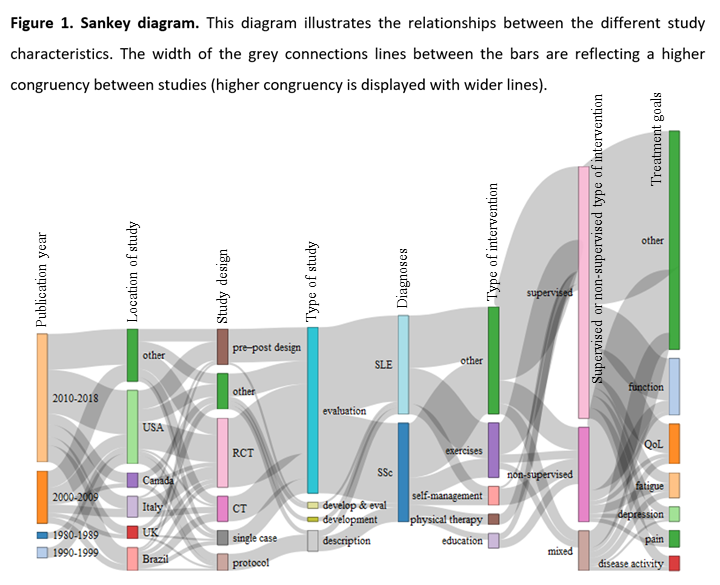Session Information
Session Type: ARP Abstract Session
Session Time: 2:30PM-4:00PM
Background/Purpose: Autoimmune Connective Tissue Disorders (CTDs), including Mixed Connective Tissue Disorders (MCTD), systemic sclerosis (SSc) and systemic lupus erythematous (SLE) can lead to Raynaud phenomenon, involvement of internal organs, pain in joints, skin abnormalities and muscle weakness. Consequently, people with CTDs experience limitations in activities of daily life and restrictions in participation. Programmes promoting patient education, self-management, physical activity, and healthy life style, provided by health professionals are therefore essential to these patients. However, there is a substantial gap of knowledge about the content which should be included in non-pharmacological intervention programmes.
The purpose of this study was to identify, map and appraise the content of existent face-to-face, digital and/or distance-learning non-pharmacological intervention programmes for patients with MCTD, SSc and/or SLE to inform a EULAR funded project with the overall aim to develop a new distance learning programme realizable with digital technologies.
Methods: A scoping literature review with a nested descriptive meta-analysis was performed in MEDLINE [Pubmed], EMBASE [OVID], CINAHL [EBSCO], PsycINFO [ProQUEST], the Cochrane Database of Systematic Reviews, OTSeeker, PEDro, and SciELO in September 2018. Furthermore, an international task-force identified additional grey literature and ongoing research projects. Eligibility checks of the articles based on pre-defined in- and exclusion criteria and data extractions were done independently by two researchers. The interventions contained in these programmes were extracted using the “Better reporting of interventions: template for intervention description and replication (TIDieR) checklist and guide”. A Sankey diagram and descriptive statistics were used to illustrate the relationships between the interventions and other characteristics of the studies. The protocol was pre-published on ResearchGate.
Results: Of 6667 identified records, 94 papers were eligible. Sixty-one studies (65%) were conducted between 2000 and 2018, mainly in the USA (35 [37%]), Brazil (11 [12%]) and Italy (10 [11%]). Thirty-three studies (35%) were randomised controlled trials, 17 (18%) were one-group pre-post-test designs and 12 (16%) clinical trials without randomisation (Figure 1). Overall, 4274 patients participated; 2955 had SLE [69%] and 1319 had SSc [31%], thus no studies with MCTD where found. The main content of the intervention programmes included exercises (22 [23%]), self-management (9 [10%]) and education (7 [7%]), with treatment goals focusing mainly on physical function (27 [29%]), quality of life (19 [20%]) and fatigue (12 [16%]). The interventions (67 [72%]) included or were based on an initial face-to-face component.
Conclusion: There was a variety of programmes content and interventions due to different consequences regarding activity limitations and participation restrictions in autoimmune CTDs. This highlights the need for personalized, multicomponent, non-pharmacological interventions.
To cite this abstract in AMA style:
Ritschl V, Ferreira R, Fernandes R, Santos E, Juutila E, Mosor E, Fligelstone K, Gaspar H, Schraven L, Ammerlaan J, Stummvoll G, Salvador M, Poole J, van den Ende C, Boström C, Stamm T. The Need for Personalized, Non-Pharmacological Intervention Programmes in Autoimmune Connective Tissue Disorders: Results of a EULAR-Funded Scoping Review with a Nested, Descriptive Meta-Analysis [abstract]. Arthritis Rheumatol. 2019; 71 (suppl 10). https://acrabstracts.org/abstract/the-need-for-personalized-non-pharmacological-intervention-programmes-in-autoimmune-connective-tissue-disorders-results-of-a-eular-funded-scoping-review-with-a-nested-descriptive-meta-analysis/. Accessed .« Back to 2019 ACR/ARP Annual Meeting
ACR Meeting Abstracts - https://acrabstracts.org/abstract/the-need-for-personalized-non-pharmacological-intervention-programmes-in-autoimmune-connective-tissue-disorders-results-of-a-eular-funded-scoping-review-with-a-nested-descriptive-meta-analysis/

